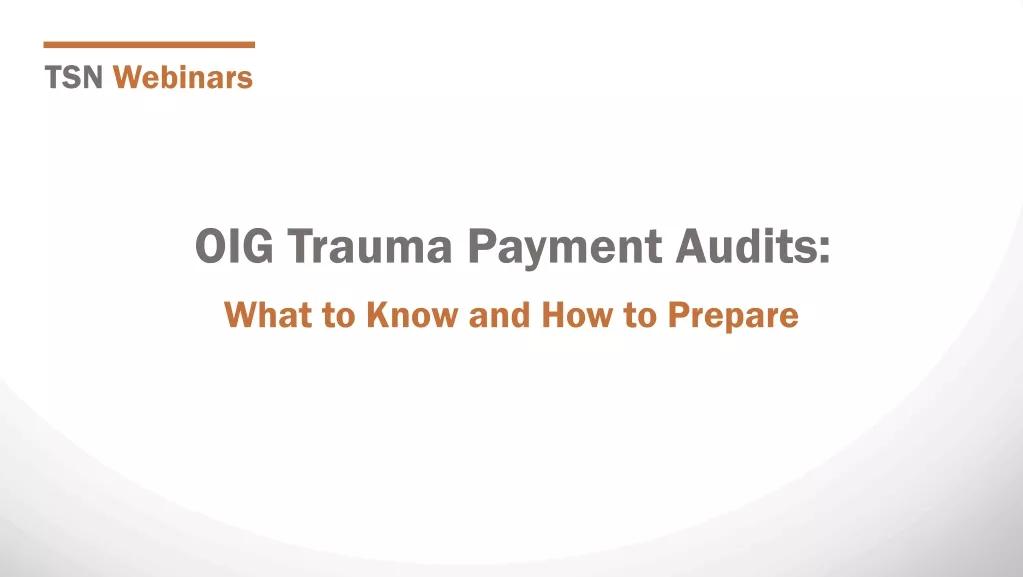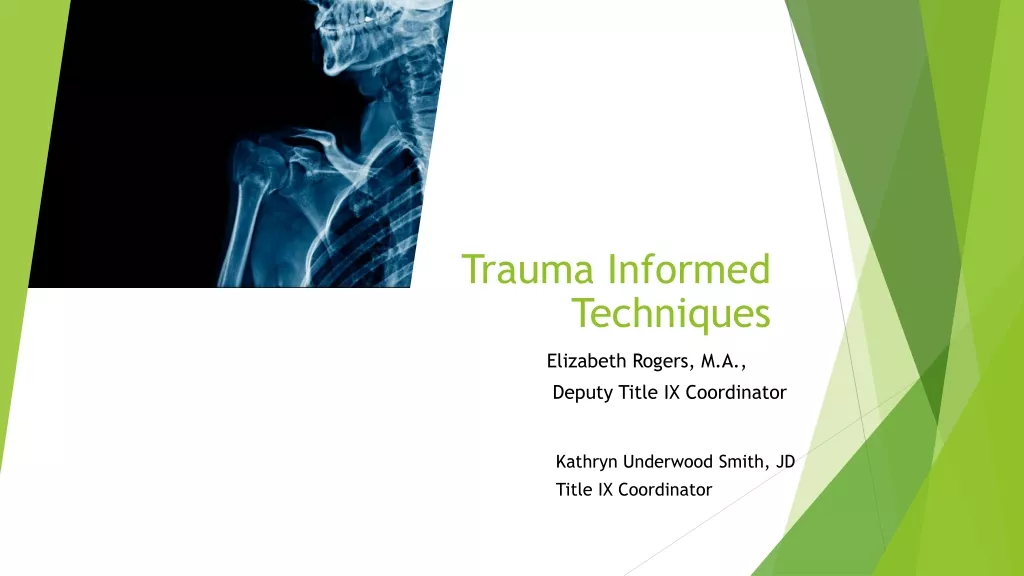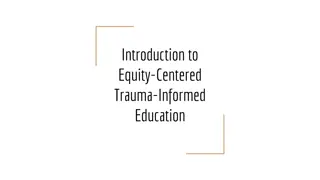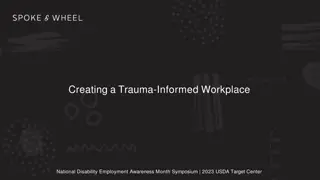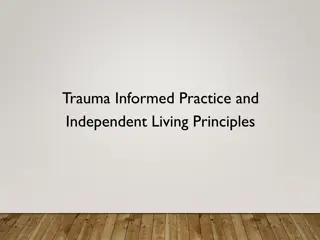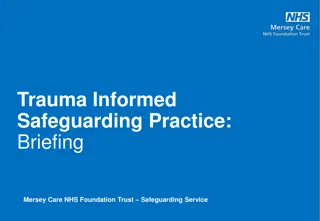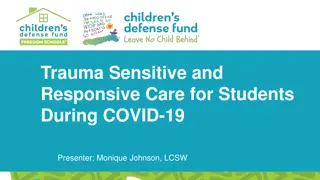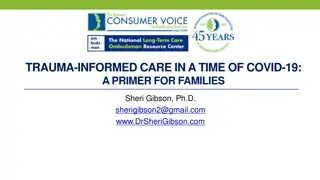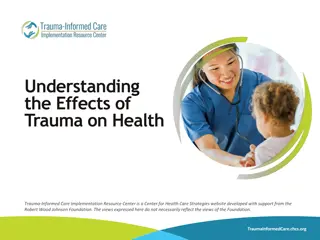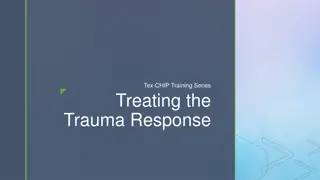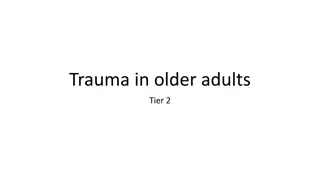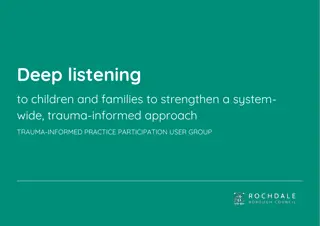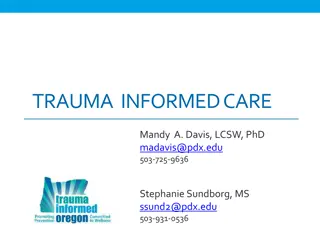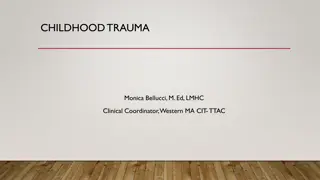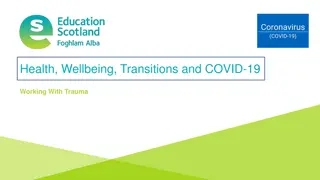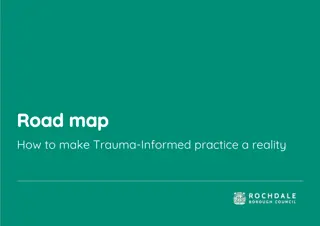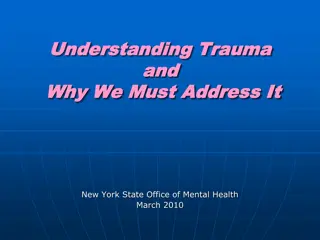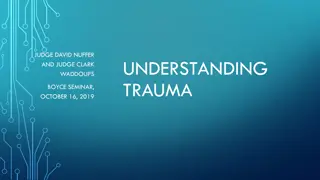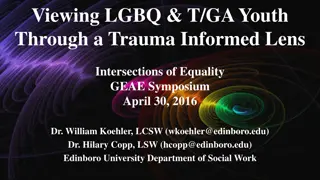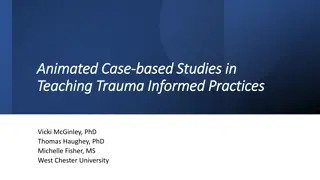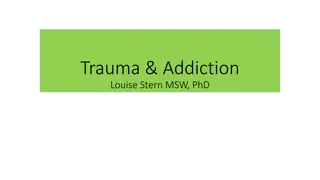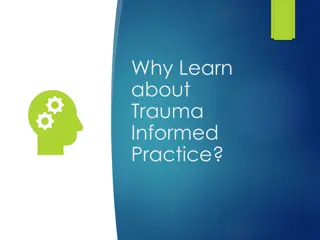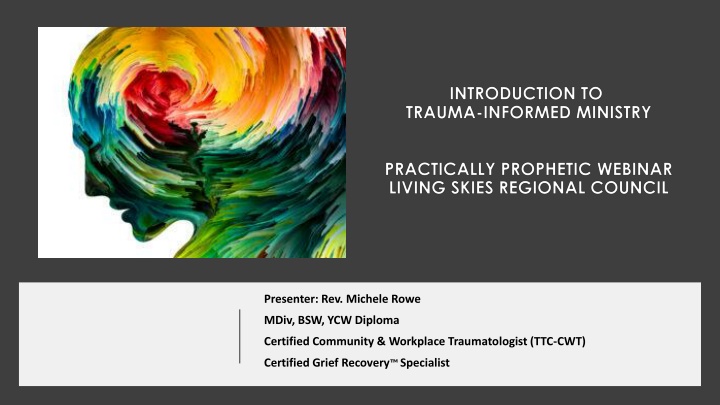
Trauma: Effects, Responses, and Healing Strategies
Explore the origins of trauma, its diverse impacts on individuals and communities, and the importance of Trauma-Informed Ministry in responding effectively to trauma for healing and restoration. Gain insights on pandemic-related trauma and how it has affected individuals and clergy. Discover the need for equipping ministers with Trauma-Informed Ministry principles to support those experiencing trauma, promoting healing and resilience.
Uploaded on | 1 Views
Download Presentation

Please find below an Image/Link to download the presentation.
The content on the website is provided AS IS for your information and personal use only. It may not be sold, licensed, or shared on other websites without obtaining consent from the author. If you encounter any issues during the download, it is possible that the publisher has removed the file from their server.
You are allowed to download the files provided on this website for personal or commercial use, subject to the condition that they are used lawfully. All files are the property of their respective owners.
The content on the website is provided AS IS for your information and personal use only. It may not be sold, licensed, or shared on other websites without obtaining consent from the author.
E N D
Presentation Transcript
Presenter: Rev. Michele Rowe MDiv, BSW, YCW Diploma Certified Community & Workplace Traumatologist (TTC-CWT) Certified Grief Recovery Specialist
The Origins of Trauma Trauma is not something that happens only to soldiers or emergency responders. The Canadian Psychological Association reports 76% have experienced at least one traumatic event. About 1/10 Canadians will meet the criteria for Post Traumatic Stress Disorder over their lifetime. (Strickland 2020) Epigenetic & environmental components to trauma Trauma is a natural response to an event that overwhelms our capacity to cope Trauma responses are individual & diverse Results in cognitive, physical, emotional, behavioural, and spiritual symptoms that affect well-being May be acute (from an initial/single event) Chronic (multiple, long-term, and/or prolonged traumatic events over an extended period) Complex (varied and multiple traumatic events or experiences, generally within the context of an interpersonal relationship)
Individual trauma is defined as "a blow to the psyche that breaks through one's defenses so suddenly and with such brutal force that one cannot react to it effectively. Collective trauma is "a blow to the basic tissues of social life that damages the bonds attaching people together and impairs the prevailing sense of communality. (Erikson, 1972) Disaster-Related Trauma The COVID pandemic was a global, universally-experienced disaster resulting in individual & collective trauma While consequences were mediated by access to resources, everyone was affected to some degree Our experience may have been exacerbated by current/previous trauma
Pandemic Trauma & Ministry Communities of faith experienced trauma responses related to lockdowns, mask mandates, service cancellations, inability to gather for celebrations or mourning, lack of capacity for technology demands, social isolation, conflict over health decisions, financial stressors, etc. Clergy faced changing work conditions, increased interpersonal conflict, inability to eliminate health risks, barriers to carrying out ministry role, inappropriate expectations, etc which led to burnout While some pandemic conditions have eased, long term consequences will remain A return to ordinary life will still be impacted by trauma
Trauma Trauma- -Informed Ministry Informed Ministry The Purpose of Trauma Informed Ministry (TIM) is: To equip ministers and ministries to respond effectively to individual and collective trauma so that healing comes and we live into a fuller meaning of Christian gospel. Trauma Informed Ministry (TIM) is a caring response to those who may be traumatized that uses principles known to be helpful to traumatized people for communication, treatment and healing. Rev. Diane Strickland in Trauma-Informed Ministry: A Primer for Ministers and Ministries (2020)
6 Principles (Strickland, 2020) 1. Safety Are people feeling safe enough to share their experiences? Where is anxiety gathering for individuals? Groups? 2. Trustworthiness Do we suit up and show up for ourselves? For others? Are we willing to implement vulnerability and risk in connecting? 3 . Choice Real or perceived lack of choices is a key experience in trauma Empowering choices, large and small, builds connection and competence
4. Collaboration A person demonstrating trauma stress is the expert on their initial experiences and attempts to heal Are stress symptoms such as cognitive rigidity, exhaustion, and high control needs make collaborating difficult? Are my stress symptoms (difficulty concentrating, exhaustion, history of trauma) making it a good time to let others take the lead in collaboration? 5. Empowerment People need to hear that they have what it takes to engage in trauma recovery, which requires: safety, remembering and mourning, and reconnecting to life and others (Herman, 1992) We are reminded to participate in God s love for us known as gospel 6. Awareness of and Sensitivity to Identifiable Trauma-Impacted Groups Within Society Certain groups have experienced persistent and/or unacknowledged and/or multigenerational trauma Trauma is a natural response to systemic unjust and inhumane treatment
Inside Out Inside Out The TIM model shifts trauma-informed care inward Everyone engaged in ministry benefits from applying the principles to themselves and receiving them from others Identifying and healing our own trauma is good and necessary Called to share in the ministry of Jesus, we knowingly and unknowingly walk towards trauma in many forms, joining others who are there participating in the Spirit s work. Ministry is marinating in trauma. [emphasis added] God, Jesus, Spirit, are always at work and people come alongside to participate in it. (Strickland, 2020)
Questions/Comments Questions/Comments
Suggested Resources Suggested Resources Herman, J. 1997, 2015. Trauma and Recovery, The Aftermath of Violence From Domestic Abuse to Political Terror. New York: Basic Books Rambo, S. 2010. Spirit and Trauma: A Theology of Remaining. Louisville: Westminster John Knox Press Addressing Spiritual Exhaustion in an Era of Cumulative Trauma Video - https://youtu.be/SytJUVpeKtk Strickland, D. 2020. Trauma-Informed Ministry: A Primer for Ministers and Ministries. Order from yourstoryissafehere@yahoo.com Pandemic Practicums Video Series - https://youtu.be/DUIX9OaerzI van der Kolk, B. 2014. The Body Keeps the Score: Brain, Mind, and Body in the Healing of Trauma. New York: Penguin Books.
Want to learn more? To request workshops, curriculum, or other resources related to trauma and trauma-informed ministry Rev. Michele Rowe 306.661.0005 the.rev.rowe@gmail.com

